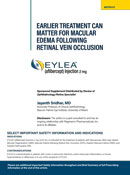 |
While no cure exists for Alzheimer’s disease, the use of acetylcholinesterase inhibitors (AChEIs) has been shown to help improve these patients’ quality of life. Subsequently, this workhorse therapy has revealed secondary benefits, including lower mortality, myocardial infarction, stroke risk and even slowed progression of chronic kidney disease. Now, a recent observational study suggests acetylcholinesterase inhibitors may reduce the incidence of age-related macular degeneration in those with Alzheimer’s.1
The retrospective cohort analysis, published in JAMA Ophthalmology, included health-care facilities within the U.S. Department of Veterans Affairs between 2000 and 2023. Participants were patients diagnosed with Alzheimer’s between ages 55 and 80 with no preexisting AMD diagnosis, totaling 21,823 veterans. Those in the treatment group receiving AChEIs every additional year resulted in a 6 percent lower hazard of AMD, compared to untreated patients.
Some research has correlated Alzheimer’s and AMD development based on drusen-producing peptides in these patients, theoretically triggering subsequent AMD. The study authors stated that their hypothesis was “based on the idea that AMD may be linked to neuroinflammatory processes in the macula. Preclinical studies have suggested that AChEIs may have the ability to mitigate neuroinflammation.”
Study co-author Joseph Magagnoli, MS, says that, though the mechanism behind the drugs’ potential protective effect is unknown, there are some theories. “While our study provides evidence of a potential association, the specific mechanism underlying acetylcholinesterase inhibitors’ (AChEIs) protective effect against AMD remains unknown,” he says. “Building on existing preclinical research and considering the anti-inflammatory properties of AChEIs, it’s plausible that these medications could mitigate neuroinflammatory processes such as inflammasome activation in the macula, offering a protective effect against AMD. Further exploration through targeted investigations is needed to unravel the precise molecular mechanisms at play.”
Randomized clinical trials would be necessary to truly evaluate any cause-and-effect relationship, according to the authors. They point out their treatment allocation wasn’t randomized, therefore making selection bias and confounding factors possible. “Our study used as many variables in the propensity model as possible, including all diagnoses within a year prior to study index to minimize any systematic differences,” they wrote. The use of data from the VA also potentially limits the generalizability of the findings to the broader population, according to the authors. “Lastly, this study does not account for genetic risk factors which could confound the results,” they concluded.
Ultimately, this study bolsters the body of literature demonstrating the secondary benefits of AChEIs which may play a significant role in treatment decisions for Alzheimer’s patients.
“Our research team has a dedicated focus on age-related macular degeneration,” Mr. Magagnoli says. [Jayakrishna Ambati, MD] leads the efforts to unravel the molecular basis of macular degeneration with preclinical research examining inflammation. In this manuscript, our exploration of inflammation, coupled with the potential of AChEIs to impact inflammation, guided our hypothesis. The outcomes of our study reveal a potential correlation between AChEIs’ anti-inflammatory properties and their ability to reduce AMD incidence. We were excited that our findings supported our hypothesis. Based on our preclinical research regarding inflammatory pathogenesis of AMD, AChEI medications could offer some protection against neuroinflammation.
“Although our study examined class-wide associations of AChEI use, future investigations could explore the effects of individual drugs within this class,” Mr. Magagnoli adds. “Understanding how these medications may prevent AMD through mechanisms such as inflammation modulation requires further exploration. A randomized control trial would be needed to evaluate the clinical relevance of this pathway for AMD. There is an ongoing trial of an inflammasome inhibitor in geographic atrophy (NCT06164587). RS
REFERENCE
1. Sutton SS, Magagnoli J, Cummings TH, Hardin JW, Ambati J. Alzheimer disease treatment with acetylcholinesterase inhibitors and incident age-related macular degeneration. JAMA Ophthalmol. January 4, 2024. [Epub ahead of print].



